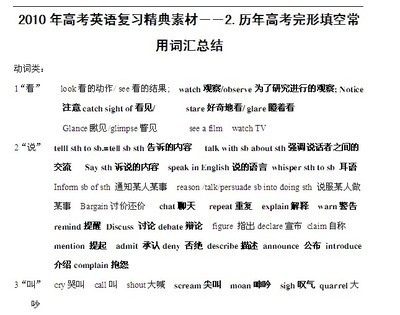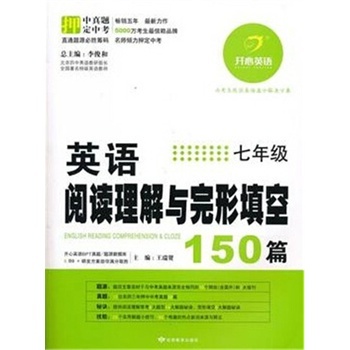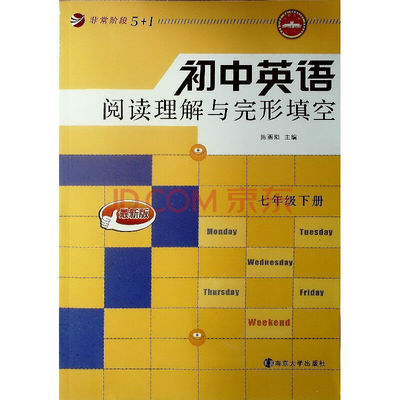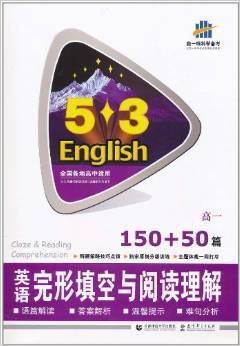完形填空是中高考常见的一种题型。下面是小编收集整理的高三英语完形填空练习题目及其参考答案以供大家学习!
高三英语完形填空练习题(一)My work keeps me in Hong Kong most of the year. But I do try to get away for a month in the ___1___ —usually July. Now as you probably know, that’s the main holiday ___2___ in Europe, and the favourite place for a(n)___3___ and the famous cities are usually very ___4___. But I’m not seeking the sun—I get plenty of ___5___ in Hong Kong—and I’m certainly not seeking the ___6___! So when I go on holiday I buy a Train Pass(a kind of train ticket) that ___7___ me first class travel on most the railways of Western Europe. First class compartments are ___8___ crowded, and they are very comfortable. If you go on an overnight journey, you can take a(n)___9___ train with some extra money. There are usually ___10___ cars in the train.
I find the train travel relaxing and ___11___. There is always something to see. I particularly enjoy ___12___ through Switzerland and Italy. You can get a very good ___13___ of what a country is like from a train. You don’t go too ___14___, and you stop very often. Also, rail travel is very ___15___, and I am never as sick on a train ___16___ I am on a ship! Then there are always people to ___17___ if you like to chat.
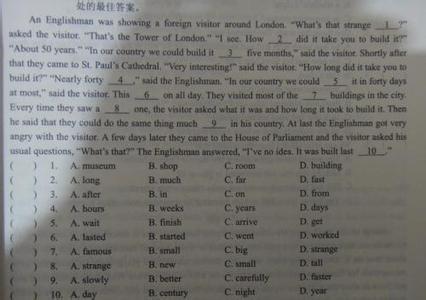
The reason that I seldom travel by plane is quite ___18___: as train stations are usually built in the city centre, I ___19___ worry about transport, which can be a problem when arriving ___20___.
1. A. Hong Kong B. Italy C. winter D. summer
2. A. year B. season C. festival D. week
3. A. holiday B. play C. sports D. entertainment
4. A. far B. beautiful C. crowded D. expensive
5. A. money B. sunshine C. shower D. rest
6. A. people B. truth C. salary D. crowds
7. A. shows B. suggests C. allows D. offers
8. A. never B. rarely C. rather D. too
9. A. free B. express C. sleeping D. special
10. A. lunch B. cooking C. supper D. dining
11. A. instructive B. active C. boring D. interesting
12. A. traveling B. working C. studying D. walking
13. A. sight B. plan C. suggestion D. idea
14. A. slowly B. fast C. smoothly D. far
15. A. dangerous B. lonely C. safe D. serious
16. A. like B. as C. while D. when
17. A. refer to B. talk to C. learn about D. worry about
18. A. simple B. complex C. near D. hard
19. A. couldn’t B. mustn’t C. don’t have to D. oughtn’t to
20. A. by sea C. by land C. on foot D. by
高三英语完形填空练习题答案:本文主要通过作者的经历谈论乘火车旅游的优越性。在旅游旺季乘火车很少出现拥挤的情况,况且还有卧铺及餐车等,很方便;乘火车速度慢,可以欣赏诸如瑞士和意大利等国家的美景,而且还不像乘船那样晕船或不舒服;乘火车也比乘飞机好,因为火车站建在城里,可减少乘飞机要改乘车辆进城的问题等。
1. D。从破折号后面的解释可推测“我”常在夏天(7 月份)离开香港(去欧洲)旅游。从上下文来看,不是在香港旅游,而意大利只是欧洲的一个城市,也不合乎语境。
2. B。前面提到 7 月份,针对此我们可推测这(7 月份)正是欧洲主要的度假季节。其他如 year, week 都不合上下文。
3. A。此处指假期旅游,故选 holiday 才符合语境。
4. C。从下文“我”乘火车旅游及 First class compartments are __8__ crowded, and they are very comfortable 等来看,此处指“拥挤”问题。若选用 beautiful, expensive, far 等都不合话题。
5. B。破折号后面的内容应是对 But I’m not seeking the sun 的解释或说明,故用 sunshine。
6. D。从下文“我”避开拥挤,乘火车旅游等来看,此处说的是“我”不追赶人群,重要的是舒适和观景。此处用 crowds 指的是“外出旅游的人群”,若用 people 范围太大,不合实际。
7. C。从这里起开始谈论“我”喜欢乘火车旅游的理由。从语境看,这里说的是买一张 Train Pass,可以得到在西欧一流的旅游。allow 为“让……得到”,后接双宾语。从语法上来看,好像 offer 也可,但 offer 意为“主动提供”,而这里说的是在买票后站方才提供服务,故排除 offer(www.yygrammar.com)。
8. B。从语境特别是 and they are very comfortable 等来看,坐头等车厢应该是很少有拥挤现象。never 意为“从不”,太绝对,应排除。
9. C。从 If you go on an overnight journey 可推测,此处说的是再加些钱可乘座卧铺来过夜。
10. D。从语境及常识来看,此处用 dining 为好。dining car 为“餐车”。
11. D。从下文 You can get a very good ___13__ of what a country is like…, Then there are always people to ___17___…if you like to chat 等来看,此处说的是“我觉得乘火车旅游很放松也很有趣”。
12. A。从上下文来看,此处说的是“我”特别喜欢在瑞士和意大利旅游(第 1 段提到在香港工作,排除 B、C、D)。
13. D。句意为:火车开得慢,从火车上可以了解一个国家的样子。get an idea of 意为“对……了解,有个大体印象”。
14. B。从后句 and you stop very often 及下文的不容易晕车等来看,这里说的是火车速度(相对)比较慢。
15. C。从上下文我们可排除 lonely,因为下文说你可以与人交谈。从火车速度慢等来看,此处指乘火车比较“安全”才合理。
16. B。此处说的是乘火车不像乘船那样容易出现晕船现象。as…as… 是固定结构。
17. B。从后面的 if you like to chat 可推测,这里说的是在火车上可以与人交谈。
18. A。从后面所给的缘由来看,此处说的是我很少乘飞机旅游的原因很简单,就是火车站建在市中心。
19. C。由于火车站建在市中心,所以乘火车就不必担心交通问题。don’t have to 意为“没有必要,不必”。
20. D。前面说乘火车不必担心交通问题(进城),而乘飞机进城交通就成为问题了,这与该段第1句话相照应。
高三英语完形填空练习题(二)In Taiwan, “motorpool” is commonly known as a place for the maintenance (维修) of official business and government cars. In ___1___ it is a place for vehicle maintenance.
More than ten years ago, I came to America on business and I ___2___ advantage of the chance to visit my friend. My friend drove a car to ___3___ me at the airport, and took me to his home. ___4___ the airport, my friend drove his car into the innermost lane, ___5___ had a sign “carpool only”. I wondered what “carpool” meant. I felt ___6___ whether he was going to a motorpool. So I thought myself ___7___ in asking: “Is there anything wrong with the car?” “Nothing, ___8___?” said he. “Well then, why are you going to a carpool?” I responded. My friend couldn’t help ___9___ and told me that “carpool” ___10___ to the lane that only the cars with two or more passengers can ___11___. I felt rather embarrassed ___12___ that.
After dinner, my friend’s neighbor ___13___ to ask whether he could carpool the next day. “___14___,” my friend said, “I will accompany my friend to go shopping tomorrow.” I was puzzled again, ___15___ why he could not “carpool” with him since we had “carpooled” ___16___. My friend explained to me again that the “ carpool” with him that ___17___ used meant they in turn drove the car to work so as to save ___18___. The first “carpool” is a noun; ___19___ the second “carpool” is a verb. It is really difficult for ___20___ in America to understand it in a short time.
1. A. common B. time C. general D. short
2. A. took B. had C. used D. found
3. A. see B. take C. meet D. accept
4. A. In B. Out of C. Inside D. From
5. A. where B. which C. it D. there
6. A. doubted B. surprised C. unexpected D. excited
7. A. puzzled B. foolish C. interested D. clever
8. A. isn’t it B. why C. where D. what
9. A. laughing B. shouting C. stopping D. saying
10. A. means B. refers C. is D. comes
11. A. pass through B. go over C. drive in D. sit in
12. A. in saying B. for doing C. on hearing D. at listening to
13. A. went out B. came over C. arrived D. got off
14. A. Yes B. I’m afraid C. Sure D. No
15. A. wondering B. saying C. suggesting D. hesitating
16. A. yesterday B. tomorrow C. the last day D. today
17. A. his neighbor B. his friend C. he D. I
18. A. time B. money C. energy D. pollution
19. A. and B. while C. so D. or
20. A. newcomer B. people C. Chinese D. those
高三英语完形填空练习题答案:1. C。比较:in common=有共同之处,in time=及时,in short=简单地说,in general=一般说来。比较之下,in general 最合适。
2. A。take the advantage of the chance 指“利用机会”。
3. C。到机场接人用动词meet。
4. B。根据 …drove his car into the innermost lane可推知,汽车应是开出飞机场。
5. B。which 引导非限制性定语从句并在从句中作主语。
6. A。根据上文I wondered what “carpool” meant 可知,作者不能确定motorpool是否是carpool。
7. D。从下文闹的笑话看,作者是自作聪明。
8. B。我的朋友不知道我把motorpool, carpool看成是一个意思,汽车也没有出故障,故感到吃惊,不知我为何问此问题。
9. A。因为我的无知,朋友忍不住笑起来,并向我解释carpool的含义。
10. B。refers to 意为“意指”。
11. C。汽车行使用动词drive。
12. C。当我的朋友向我解释之后,我很尴尬。on doing sth 的意思是“一…就…”。
13. B。根据上下文可知,邻居从自家过来有事相商。
14. D。从下一句I will accompany my friend to go shopping tomorrow 可知,朋友不能与他共车。
15. A。I was puzzled说明我不明白carpool的另一含义。
16. D。事情就发生在今天。
17. A。朋友再一次向我解释carpool的含义,而这个carpool是邻居讲出来。
18. C。轮流开车上班可节省汽油。
19. B。while 表示对比,意为“而”。
20. A。对刚到美国的人来说,在短时间内弄懂某些习语是很困难的。
 爱华网
爱华网